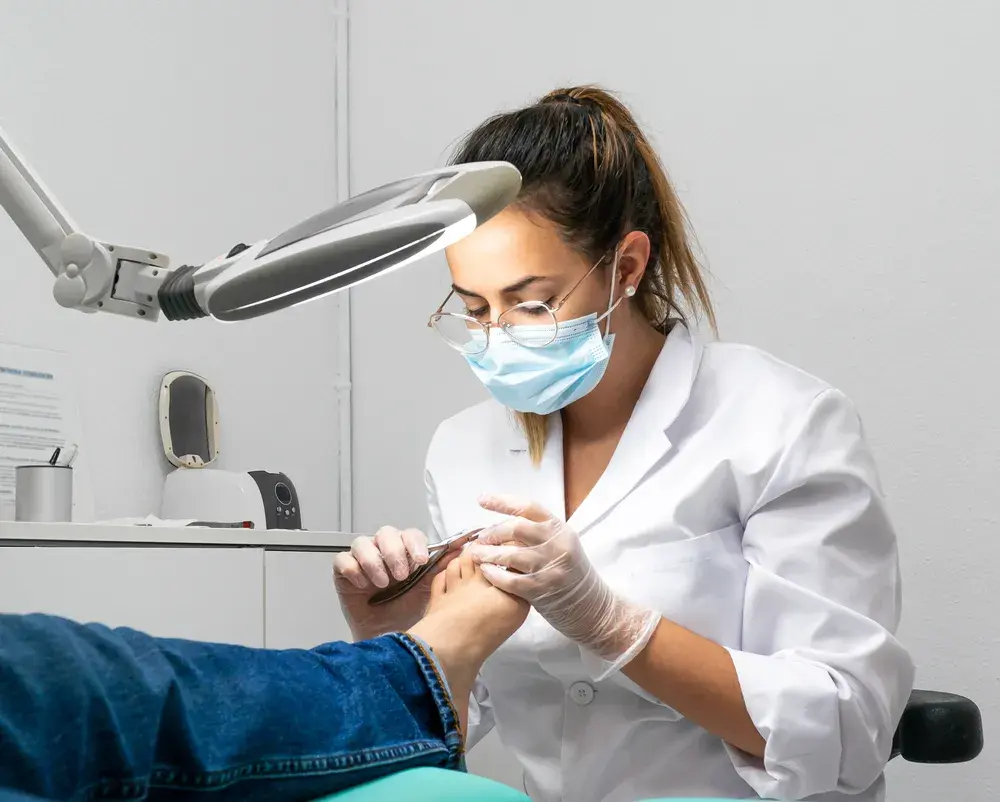PLANO, TX — February 2026 — PracticeEHR has earned recognition as a 2026 FrontRunner for Electronic Medical Records by Software Advice. The FrontRunners report identifies top-performing software products by evaluating...
The landscape of podiatric medicine is rapidly evolving. In the midst of these rapid changes, podiatry practices have become compelled to adopt Electronic Health Records (EHR) systems tailored specifically for podiatry.
A Podiatry EHR can revolutionize your practice, enhancing patient care, streamlining operations, and ensuring compliance with regulatory standards.

Why Choose a Specialized Podiatry EHR?
Incorporating a specialized Podiatry EHR into your practice provides numerous benefits that a generalized EHR system simply cannot match. These systems are designed for the unique needs of foot and ankle care, offering tools and features that cater specifically to podiatrists.
Salient Advantages of Podiatry EHR Systems
1. Enhanced Patient Care Management
A Podiatry EHR allows for more precise and efficient management of patient records. By consolidating all relevant patient information into a single, easily accessible platform, podiatrists can ensure comprehensive care. Every detail is available at your fingertips, from medical histories to treatment plans and imaging results, facilitating more informed decision-making.
2. Streamlined Workflow
Administrative burdens are a common challenge in medical practices, but a robust Practice EHR can alleviate much of this. By automating appointment scheduling, billing, and documentation, podiatrists and their staff's core focus can be patient care instead of paperwork and administrative tasks. This improved workflow enhances the patient experience and increases practice efficiency.
3. Diagnostic Precision
Foot care often requires detailed analysis and precise diagnostic capabilities. Podiatry EHR systems come equipped with specialized charts and diagnostic tools that aid in accurate assessment and treatment. These features help identify issues early and craft effective treatment plans, thus improving patient outcomes.
Podiatry EHR Benefits Beyond the Clinic
1. Patient Satisfaction and Engagement
A well-implemented Podiatry EHR can significantly boost patient satisfaction. Features, i.e., online appointment scheduling, end-to-end encrypted messaging, and access to personal health records, give control to patients patients by giving them more control over their healthcare. Patients can easily track their progress and stay informed about their treatment plans and will engage actively in their treatment, leading to better health outcomes.
2. Financial Performance
An optimized EHR system can also enhance your practice's financial health. Through streamlined billing processes, accurate coding, and reduced administrative overhead, practices can see a noticeable increase in revenue. Many EHR systems also provide analytics and reporting tools that help identify financial trends and areas for improvement, further contributing to your practice's financial stability.
3. Scalability
As your practice grows, your EHR system should be able to grow with you. Practice EHR solutions are designed to be scalable, accommodating everything from solo practices to large podiatry clinics. This scalability ensures that the system remains adequate and efficient regardless of the size and scope of your practice.
4. Preparing for the Future
Adopting a Podiatry EHR is about meeting current needs and preparing for future advancements in healthcare technology. Innovations like telemedicine, artificial intelligence, and real-time data sharing are becoming increasingly prevalent. A robust and adaptable EHR system positions your practice to smoothly integrate these future technologies, keeping you at the forefront of medical advancements.
Key Features to Look For When Choosing a Podiatry EHR
When selecting a Podiatry EHR, it's crucial to consider features that will best serve your practice's needs. Here are some key aspects to seek out:
1. Customizable Templates
Customizable templates tailored to various foot and ankle conditions are indispensable to document visits. These templates should be easily adjustable to fit patient needs and streamline the documentation process.
2. Comprehensive Data Integration
An effective Podiatry EHR should seamlessly integrate data from various sources, such as diagnostic devices, lab results, and imaging systems. This ensures a unified patient record and provides more holistic and accurate care.
3. User-Friendly Interface
Ease of use is critical for any EHR system. A user-friendly interface ensures podiatrists and support staff can navigate the system effortlessly, reducing training time and improving daily operations.
4. Ensuring Compliance and Security
In today's digital age, data security and compliance with healthcare regulations like HIPAA are paramount. Advanced Podiatry EHR systems employ state-of-the-art encryption and regular security audits to protect patient information and ensure that your practice adheres to all necessary regulations.
Practice EHR: Meeting Podiatry Needs
Among the various EHR systems available, Practice EHR stands out for its dedication to meeting the specific needs of podiatry practices. Here’s why:
- Specialized Foot Care Features
Practice EHR offers features designed explicitly for podiatry, including detailed foot charts, integrated diagnostic tools, and customizable templates. These tools streamline the documentation and diagnostic processes, allowing podiatrists to focus on delivering high-quality foot care.
- Seamless Integration
The system supports compatibility with various diagnostic devices and other healthcare software, providing a cohesive and comprehensive patient care experience. This seamless integration is necessary if the practice keeps data easily accessible and well-coordinated.
- Robust Support and Training
Implementing a new EHR system can be a significant change. Practice EHR provides robust support and training to ensure a smooth transition. This ongoing support helps address any issues promptly and ensures that your practice can fully leverage the system's capabilities.

Customizability to Meet Your Practice's Unique Needs
Each podiatry practice is unique, requiring specific workflows and documentation needs. Practice EHR's customizability allows you to tailor the system to fit your specific practice requirements, enhancing overall efficiency and effectiveness.
Conclusion
Choosing the right EHR system is pivotal for modern podiatry practice. A specialized Podiatry EHR system, such as Practice EHR, not only streamlines operations but also enhances patient care, supports compliance, and improves diagnostic accuracy. By integrating such a system into your practice, you can focus on what truly matters—delivering exceptional foot care to your patients.
Investing in a tailored podiatry EHR system is the best way to make your podiatry practice more efficient, effective, and patient-centered, ensuring your patients receive the best possible care. Get a free demo today!
Topics: Patient Care, EHR Solution, Specialty-Specific EHR, digital age, Industry Update, Medical Billing, Medical billing services, RCM, EHR, Technology in Healthcare, Kiosk, EHR Features, ePrescribing, Podiatry EHR, Podiatry
RECENT POSTS



TOPICS
- EHR Solution (193)
- EHR (127)
- digital age (120)
- Patient Care (117)
- Medical Billing (112)
- Specialty-Specific EHR (112)
- Industry Update (98)
- Technology in Healthcare (84)
- EHR Features (79)
- Small Practice (78)
- Medical billing services (74)
- Integrated EHR (64)
- RCM (64)
- HIPAA Security (62)
- Cloud-based EHR (44)
- New Technology (44)
- Telemedicine (44)
- Healthcare Office Management (40)
- Practice EHR News (40)
- Kiosk (31)
- Revenue Cycle Management (28)
- AI Solutions (26)
- ePrescribing (21)
- AI Scribing (17)
- Best EHR Software (17)
- Practice Management Software (13)
- AI EHR (12)
- AI-powered Medical Billing (12)
- EMR (12)
- TeleVisit (12)
- AI Scribe (11)
- Practice Automation (11)
- Client Favorites (10)
- The ONE (10)
- AI scanning (9)
- Switching to New EHR (9)
- Urgent Care (9)
- Best EHR Practice (8)
- EHR Integration (8)
- MACRA/MIPS (8)
- Patient Portal (8)
- Psychiatry EHR (8)
- Medical Practice Management Software (7)
- Automated Health Tools (6)
- E-Prescribing (6)
- Product Updates (6)
- events (6)
- MIPS (5)
- Mobile EHR (5)
- Telehealth Platforms (5)
- Family Medicine EHR (4)
- HIPAA (4)
- Insider (4)
- Integrated Practice Management (4)
- Internal Medicine EHR (4)
- MIPS Reporting (4)
- Multilingual AI Scribe (4)
- Orthopedics EHR (4)
- Podiatry (4)
- Podiatry EHR (4)
- Regulatory Updates (4)
- Telehealth Platform (4)
- Automated EHR (3)
- Chiropractic EHR (3)
- Digital Experiences (3)
- EHR Flaws (3)
- EHR Implementation (3)
- EHR for Chiropractors (3)
- EHR for Small Practices (3)
- Eligibility Verification in Medical Billing (3)
- Medical Coding Services (3)
- Patient Check-in Kiosk (3)
- PracticeEHR GO App (3)
- AI Scan (2)
- Cash Flow (2)
- Cashless Payments (2)
- Clearinghouse (2)
- Dermatology EHR (2)
- EHR Scheduling (2)
- Family Medicine (2)
- Foot and Ankle Care (2)
- Foot and Ankle EHR (2)
- Health records 101 (2)
- Healthcare Compliance Certification (2)
- Medical Billing Partner (2)
- Medical Credentialing (2)
- Pediatrics EHR (2)
- Quality of Patient Care (2)
- Reporting Under MIPS (2)
- Risk and Liability in Medical Settings (2)
- Voice-Activated AI Scribe (2)
- What Works Clearinghouse (2)
- ACA Subsidy (1)
- AI Scribe for Pediatric Care (1)
- Bariatric EHR (1)
- Behavioral Health Practices (1)
- Billing Communication (1)
- Billing for Private Practices (1)
- Cardiology EHR (1)
- Charting (1)
- Data Security (1)
- Dos and Don'ts (1)
- EHR Dashboard (1)
- EHR Guides (1)
- EHR KPIs (1)
- EHR Questions to Ask (1)
- EHR Transition (1)
- EHR for Chronic Illness (1)
- EMR vs EHR Difference (1)
- ENT EHR (1)
- Endocrinology EHR (1)
- Gastroenterology (1)
- Gastroenterology EHR (1)
- General Surgery EHR (1)
- Geriatric AI scribe (1)
- Geriatrics EHR (1)
- Guides (1)
- Healthcare Practice Office Management (1)
- Help Center Videos (1)
- Insurance Reimbursement (1)
- KPI (1)
- Key Performance Indicators (1)
- Lab Processing (1)
- MACRA (1)
- Nephrology EHR (1)
- Neurology EHR (1)
- Pain Management EHR (1)
- Patient Behavior (1)
- Pediatric Care (1)
- Physical Therapy EHR (1)
- Practice Cash Flow (1)
- Practice Efficiency (1)
- Pulmonology EHR (1)
- Reconsider Your EHR (1)
- Simplify Practice Management (1)
- Staffing in Healthcare (1)
- Switch Medical Billing Providers (1)
- Urgent Care Medical Billing (1)
- Urology EHR (1)
- insurance claim denials (1)








